The difference between employees and entrepreneurs
I've recently had many conversations with people who have highlighted the difference between an employee mindset and an entrepreneur mindset. Neither is superior to the other, but you'll be frustrated and resentful if you have a mismatch between your mindset and your mode.
The difference between employees and entrepreneurs
We've had a few questions about pricing in Consultants of Choice recently. Some of our students are contracting or still employed and are used to being compensated for all their time.
You do lots of unpaid work when you go out on your own. Tasks like preparing proposals, meeting with clients, and taking care of admin are unremunerated activities - and that can be a real adjustment!
That makes sense. When you're used to operating with an employee mindset, shifting to entrepreneur mode can be a confronting change.
Changing your mode shifts your pay-off horizon. Employee or contractor has a shorter horizon, focusing on smaller increments, like hourly rates.
Running your business pushes that horizon out, focusing on the bigger picture - projects, packages, and long-term relationships.
Neither mode is superior - but they require different mindsets.
Let's dig in.
Employee mode
When you’re an employee, your employer backs you. They take on the risk of your inputs and the uncertainty of your outcomes.
That's why:
You get paid for every work hour, regardless of the output or value you create.
If the project you’re working on falters or fails, you’re not in the red financially or reputationally.
Your employer carries the risk of you on their balance sheet. They reap the rewards when things go well and suffer the consequences when they don't.
Employee mindset
There are lots of great things about an employee mindset. The most important thing is being part of something bigger than yourself. You form a web of mutual reliance and accountability with a team of people to deliver a shared outcome.
That means collaboration and influence are the most essential skills to grow your impact as an employee. As a leader, focus on mobilising, inspiring and empowering the people in your team. As a team member, focus on connecting, supporting and collaborating across boundaries.
Being an employee can be frustrating when you're an ambitious high performer. You're relying on others who may not be pulling their weight, and somebody else is getting the cash and credit for your efforts! But it does come with the joy of working together, the reassurance of a pre-determined and shared direction, and the safety of regular income.
In the employee mindset, you rely on others to achieve shared outcomes. Connect with others and collaborate for impact.
Entrepreneur mode
When you’re an entrepreneur, you back yourself. You take on the risk of your inputs and the uncertainty of your outcomes.
That's why:
You only get paid for the output or value you create, no matter how long or hard you work.
If the project you’re working on falters or fails, you suffer financially and reputationally.
You carry the risk on your balance sheet. You reap the rewards when things go well and suffer the consequences when they don't.
Entrepreneur mindset
The entrepreneurial mindset is about creating something that solves problems for others. You dig deep into your expertise, character and skillset to turn your ideas into meaningful change for your clients and customers.
That means creativity and promotion are the most essential skills to grow your impact as an entrepreneur. As a business owner, focus on building smart systems and solutions that enable excellence in others. As a solopreneur, concentrate on designing brilliant solutions and finding people to share them with.
Being an entrepreneur can be scary when you're used to the safety and security of employment. Nobody's telling you what to do, when to do it, or how much to charge. But it does come with the long-term potential for flexibility, fulfilment and financial rewards.
In the entrepreneur mindset, you go all in on you. Design creative solutions and promote them with enthusiasm.
Matching your mindset to your mode
If you have a mismatch between your mindset and your mode, you have two options: recalibrate your expectations or find a new way to allocate the risk.
If you're in employee mode but feel like you're not getting enough creative autonomy or credit, change that. Start your own thing, lead a new project, or consider contracting, commission, or bonus structures.
If you're in entrepreneur mode but feel like you're not contributing to something meaningful or making enough money, change that. Build your team, grow your reach, collaborate with others, increase the value you deliver - and capture - or get a job.
Ultimately, only you know the level of risk and uncertainty you're willing to take on and what way of working will bring out the best in you. The entrepreneurial path isn't for everyone, and nor should it be. The world needs both kinds of people - dedicated team players who work together to drive incredible outcomes and creative visionaries who create new solutions to tricky problems.
But if you're feeling the rub... it could be time for a change.
Questions to ask yourself
If you're unsure which path is right for you, try asking these questions:
Why do you go to work? To contribute or to challenge?
What brings you more joy? The belonging that comes from collaboration or the freedom to forge your path?
Who do you have more faith in? Yourself, or your boss?
How do you want to be known? As a connector or a creator?
When do you want to capitalise on your effort? Is it the safe predictability of the short-term or the uncertain opportunity of the long-term?
I hope this helped you today.
